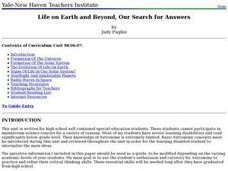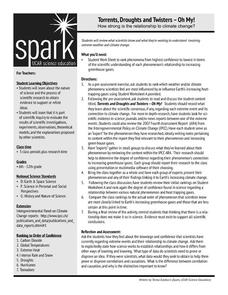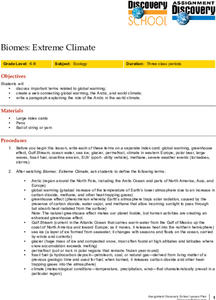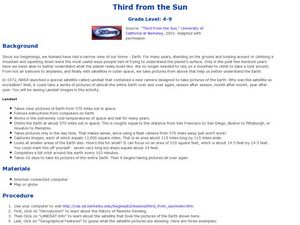Laboratory for Atmospheric and Space Physics
Jupiter’s Relative Size
How do you properly illustrate the extreme size difference between two planets—Earth and Jupiter? With the help of jellybeans, of course! Create a scale model of Jupiter's mass compared to Earth using a fishbowl, 1,400 beans, and a...
University of Colorado
Is There Life on Earth?
To find life on another planet, scientists look for gases (atmosphere), water, and temperatures that are not extreme. In this activity, groups of pupils become "Titan-ians," scientists who want to explore Earth for possible life forms....
Curated OER
Modeling Hot and Cold Planets
Young scholars, in teams, design and construct models of two planets, one hot and the other cold, using a variety of materials. They attempt to create the models out of substances that will actually show the greatest temperature...
Curated OER
Life on Earth and Beyond, Our Search for Answers
Students in a special education classroom are introduced to how the universe and solar system was formed. Using the internet, they research the characteristics of Earth that support human life. In groups, they compare and contrast...
Messenger Education
Star Power! Discovering the Power of Sunlight
It takes less than 10 minutes for energy from the sun to travel 90 million miles to Earth! In the first installment in a series of four, groups measure the amount of solar radiation that reaches Earth. They then discuss how this is...
Curated OER
Blue Planet: Seas of Life - Tidal Seas
After viewing the video Blue Planet: Seas of Life, middle schoolers review oceanic concepts. In this earth science instructional activity, students reflect on the effect tides have on living things and conduct research to create a...
Curated OER
The Toilet Paper Solar System
Explore the solar system with this lesson. Learners create a model of the solar system using toilet paper. With this creative approach, learners create a solar system according to distance and scale parameters, and write down a list of...
Curated OER
Extreme Elevations
In this geography worksheet, 5th graders work in groups in order to locate and graph mountains found on all the continents of planet earth.
Curated OER
Our Savage Planet in the News
Students research volcanoes, storms, atmospheric conditions and extreme environments. They collect information and create a simulation of a science newscast. They watch a video and write a letter as an eyewitness to an avalanche.
Curated OER
Planet Structure & Interior
Students compare Jupiter and Earth. For this Earth and space studies lesson, students compare the composition of Earth and Jupiter and analyze how the composition affects the rate at which the planets spin.
Curated OER
Biomes: Extreme Climate
Students discuss the causes of global warming. In this earth science lesson, students examine how global warming is connected to the arctic and world climate. They write a paragraph about their interconnection.
Curated OER
Martian Colony Proposals
Ninth graders design a proposal for a Martian colony to be presented to a group of their peers. They review their knowledge of Mars. Students evaluate for themselves which of their classmates proposal best fits their criteria.
Curated OER
Our Savage Planet in the News
Students explore extreme earth phenomenons. In this savage planet lesson, students explore and report on various types of severe weather and earth phenomenons using the Internet, a word processor, or other multimedia device.
Curated OER
Taking the Measure of the Universe
Four fabulous activities immerse amateur astronomers into measuring objects that we cannot handle. The experiences are applied to NASA's Space Interferometry Mission, which will take measurements of planets around stars other than our...
Center Science Education
Torrents, Droughts, and Twisters - Oh My!
What is causing the extreme weather happening around the planet? Middle and high schoolers read about climate change as a possible link to such phenomena. Then they form groups to discuss and research one of the types of weather events....
Curated OER
Planets in a Bottle
Students experiment with yeast. In this environmental conditions lesson students test the viability of samples of yeast. Students investigate the effects of environmental conditions on the yeast.
Curated OER
Mission Planning: Earth/Mars Comparisons
Students compare and contrast conditions on Mars to those on our own planet, specifically, their local or regional environments. The physical characteristics, the atmosphere, and other astronomical data is considered.
Curated OER
Our Savage Planet in the News
Students research volcanoes, storms, atmospheric conditions, etc., find information and collect facts, create a simulation of a science news broadcast, watch a video clip of an avalanche, and create an artistic rendering of one naturally...
Curated OER
Biomes: Extreme Climate
Students create a web connecting global warming, the Arctic, and wold climate. They write a paragraph explaining the role of the Arctic in world climate.
Curated OER
Extreme Climate
Students discuss global warming, greenhouse effect, permafrost and other key words. In this climate lesson students create a web that connects global warming, the Arctic and world climate then write a paragraph explaining the role...
Curated OER
Third from the Sun
Students examine images from space. In this third from the Sun lesson, students examine images from, Landsat, the satellite launched by NASA in 1972.
Curated OER
Retrograde Motion
Students study the motions of the heavenly bodies. In this space instructional activity students use models to show a variety of schemes explaining the motions.
Curated OER
The Toilet Paper Solar System
Students classify the planets in the solar system, study planetary objects, and measure the relative distance between planets. In this solar system lesson, students use toilet paper to complete a scale model of the distance between the...
Curated OER
Some Like It Hot, Some Like It Cold
Students are explained that thermophiles are organisms that have optimal growth temperatures above 50oC. They investigate the temperature ranges for the growth of common bacteria. Students answer the question of do either of these...

























